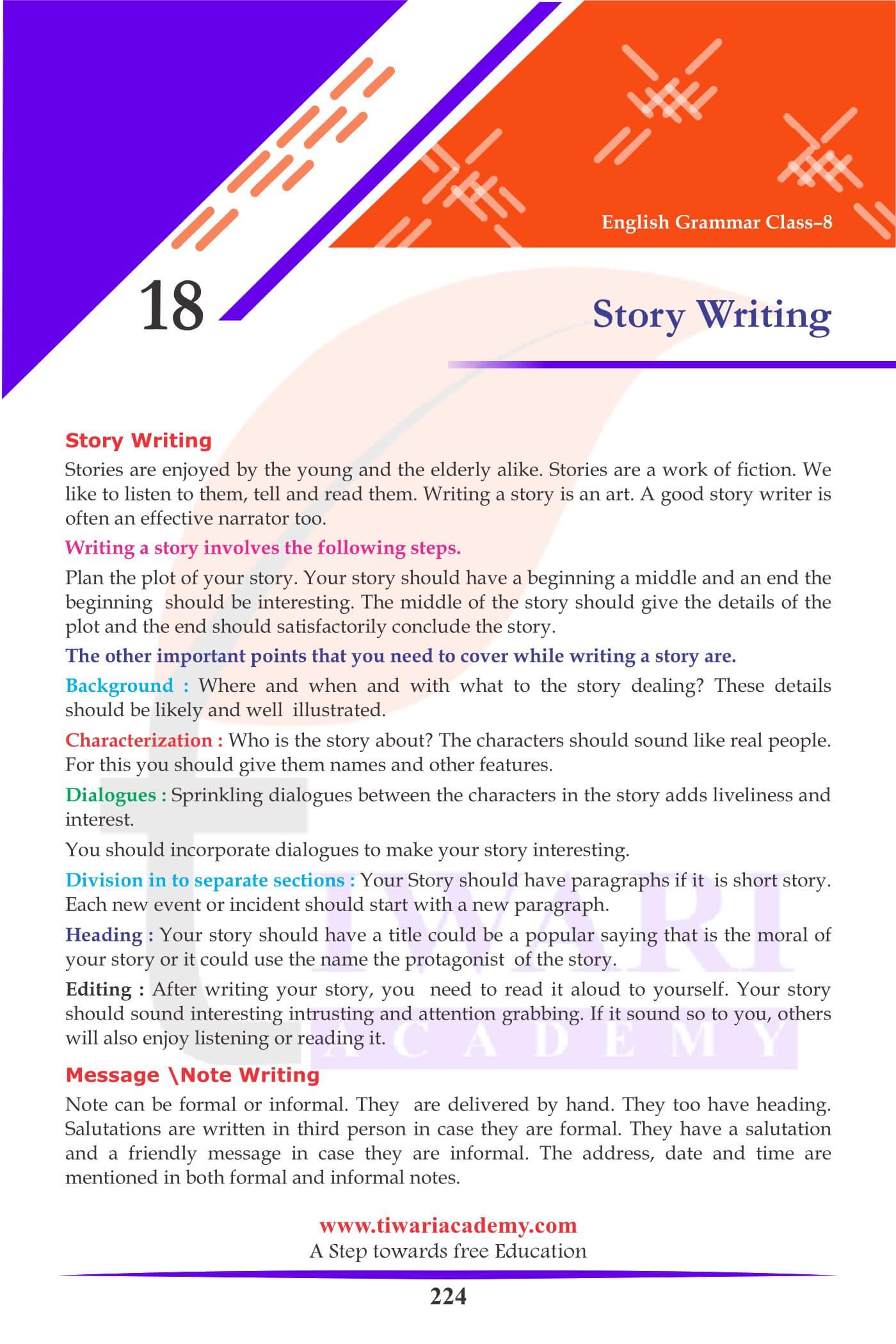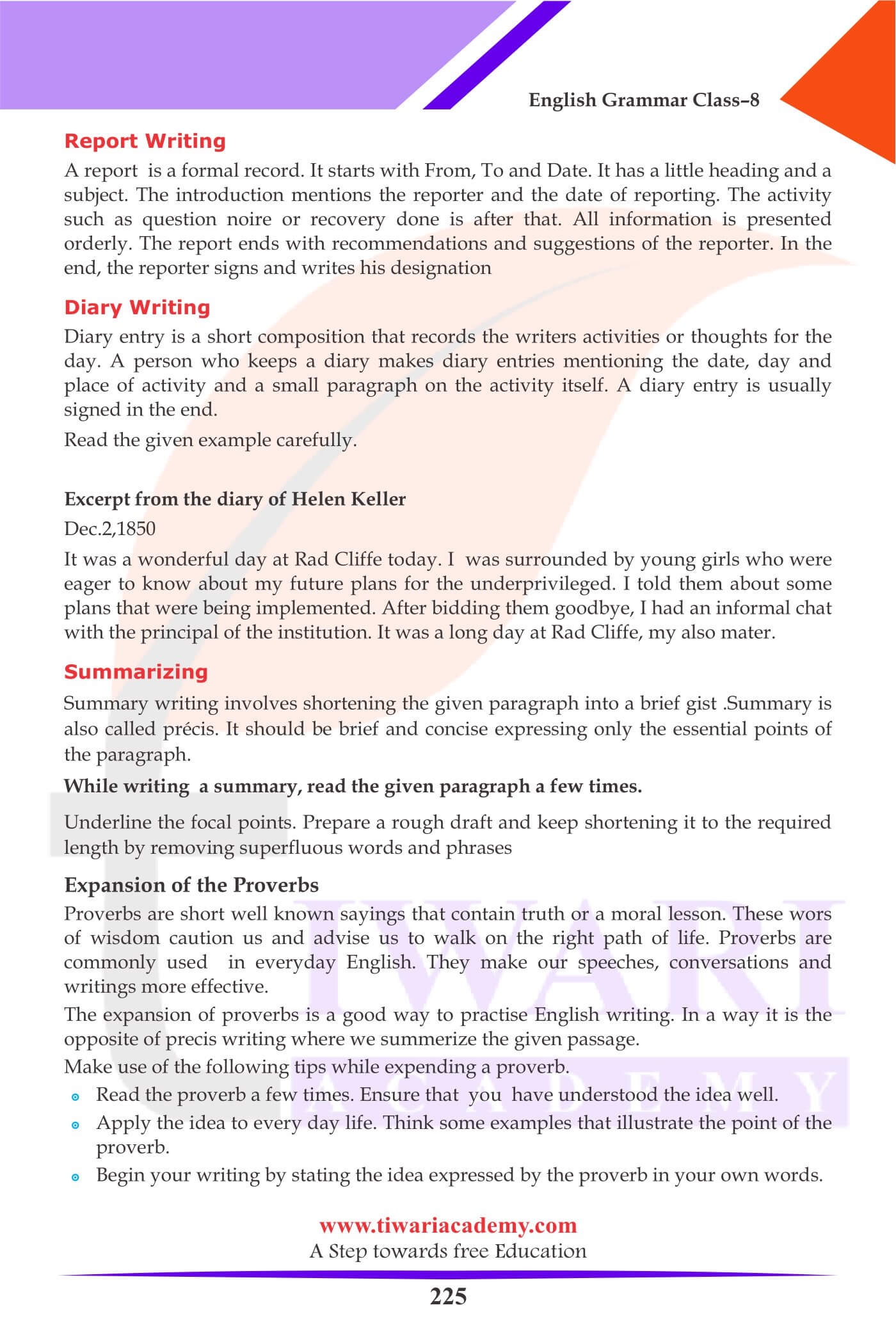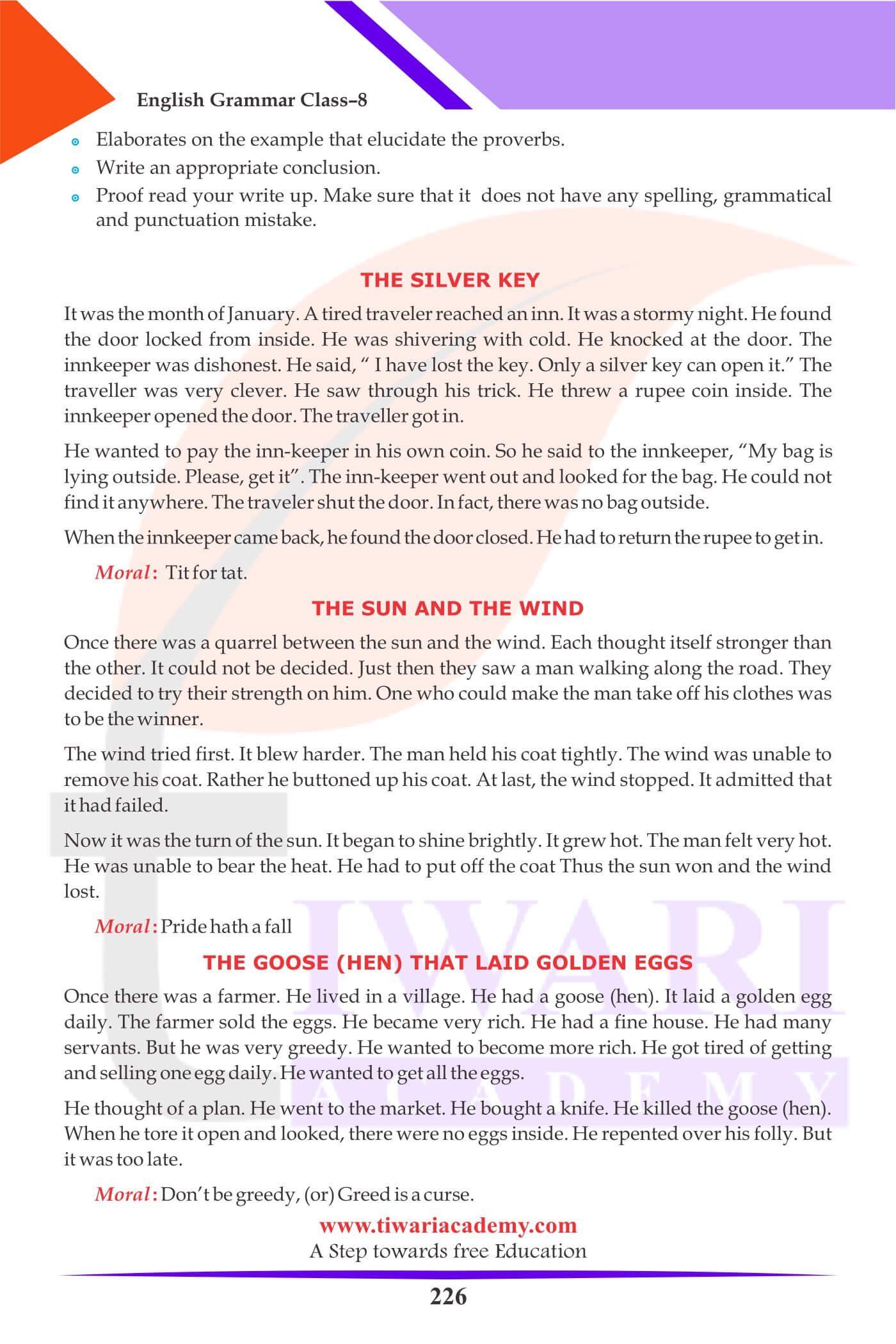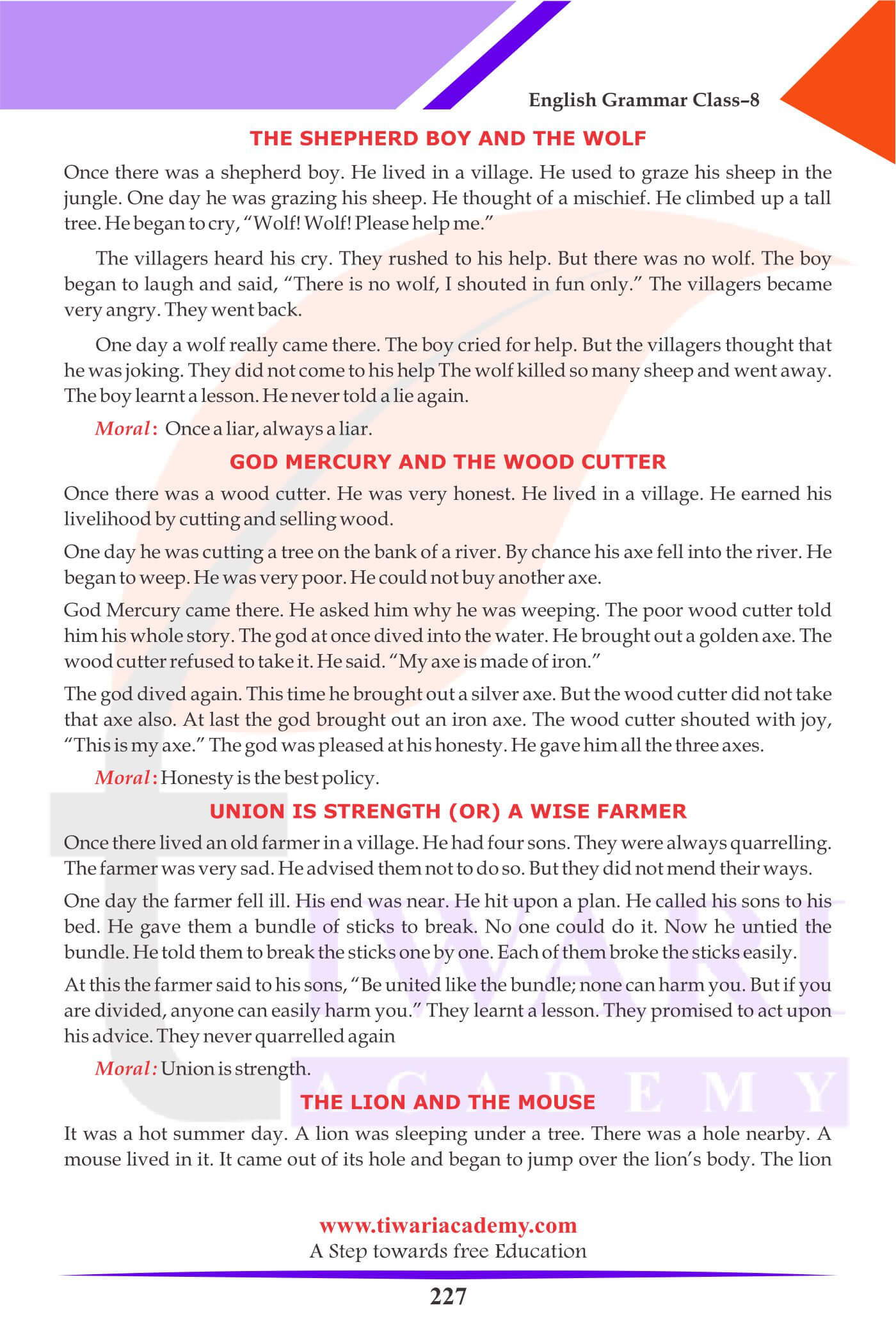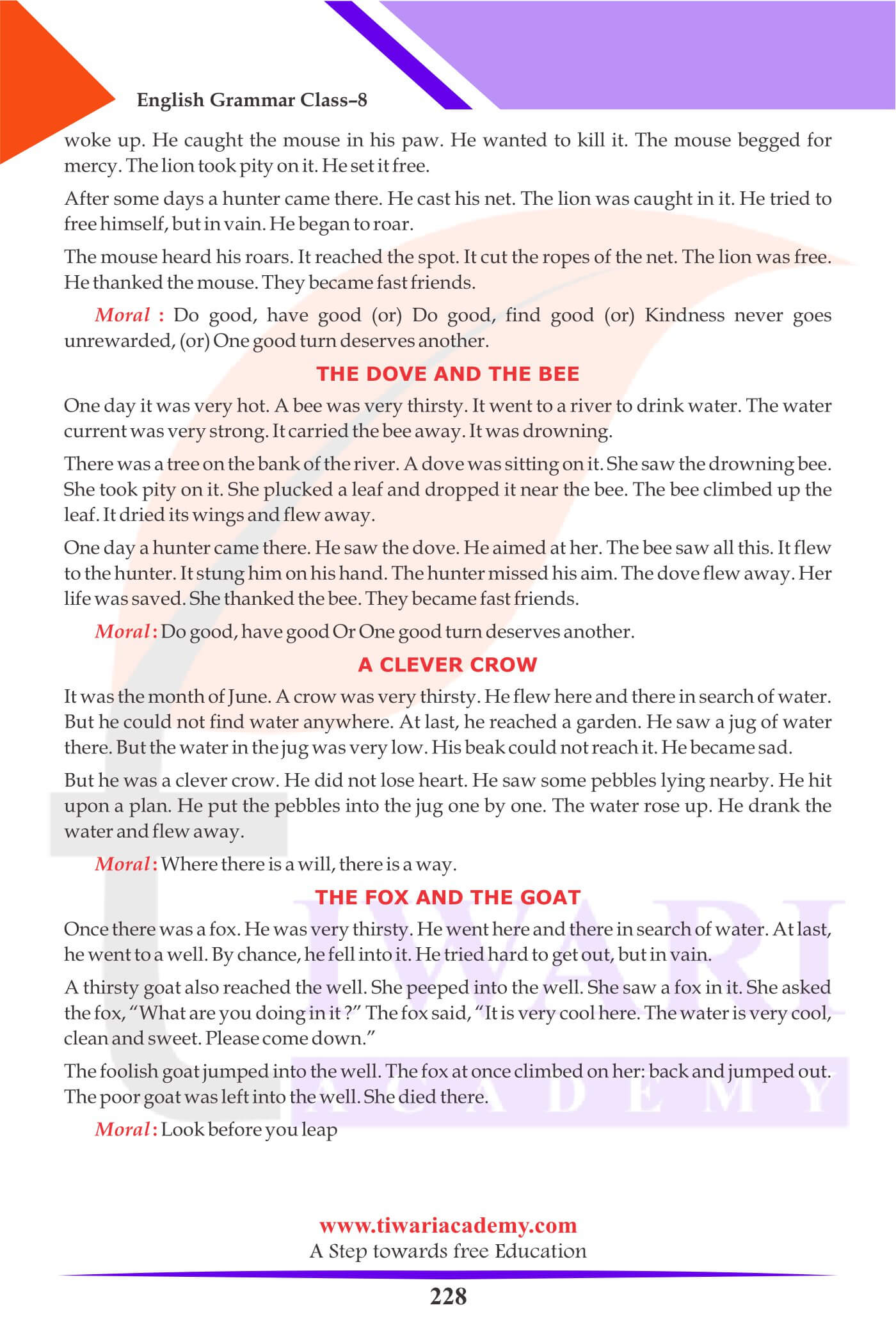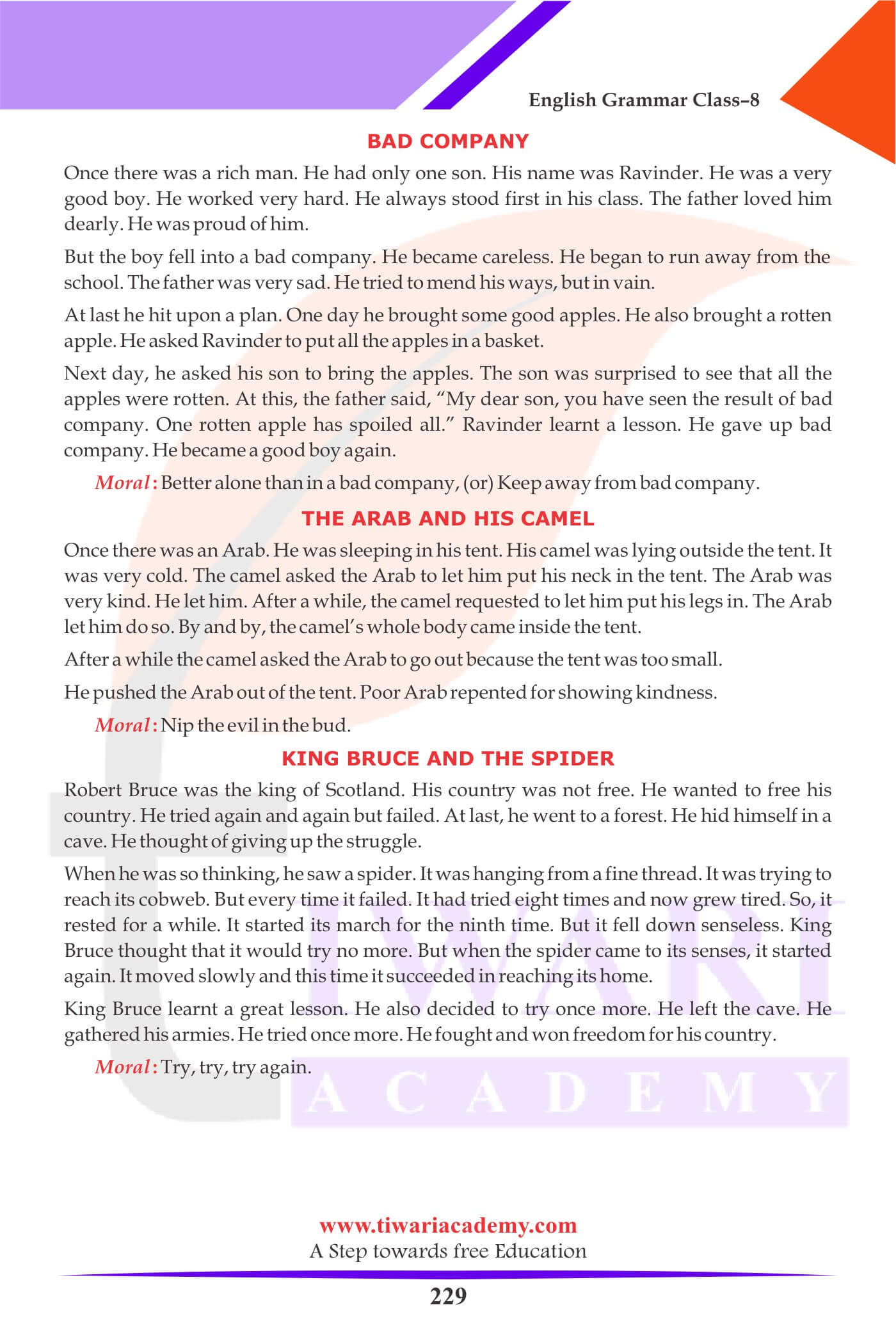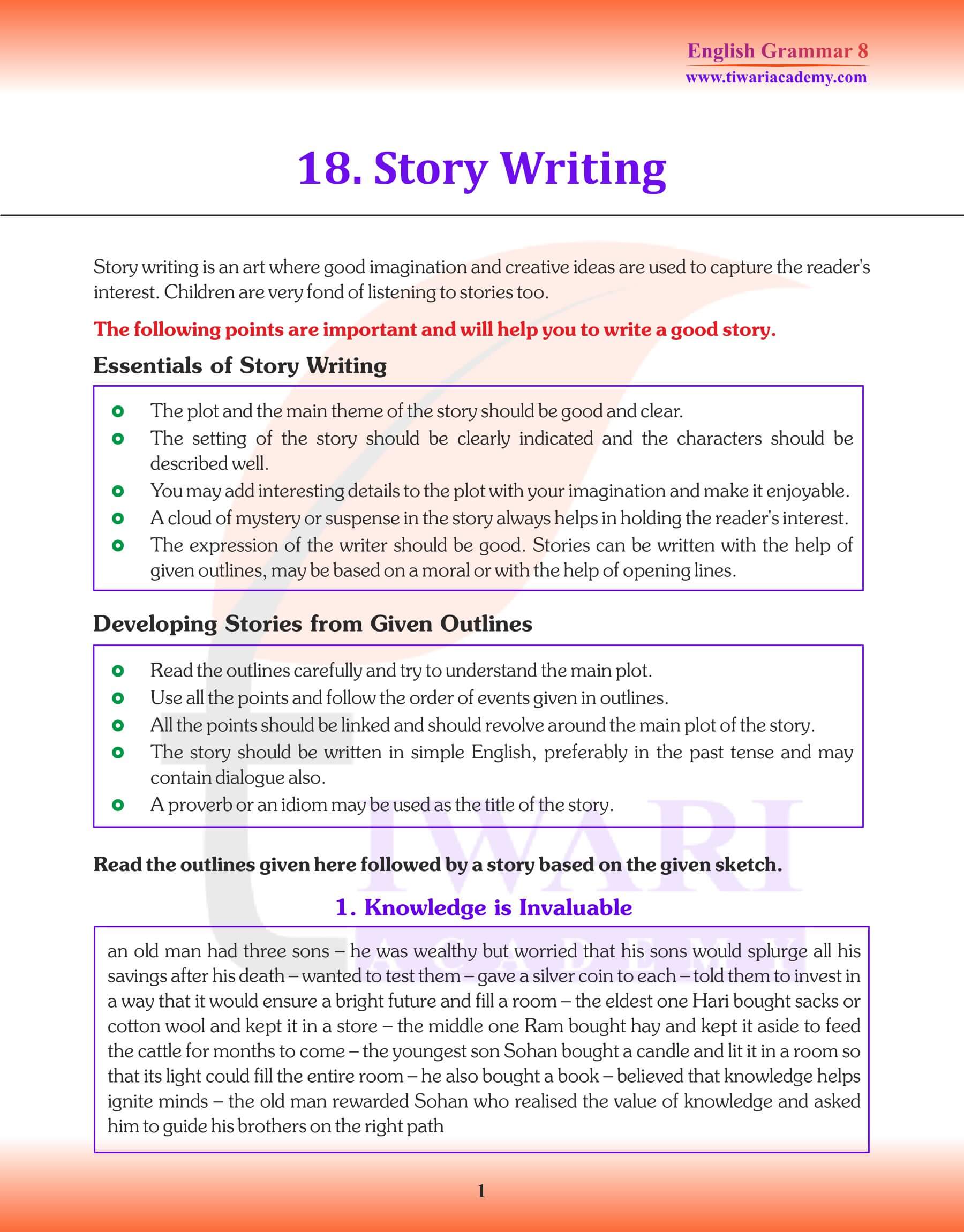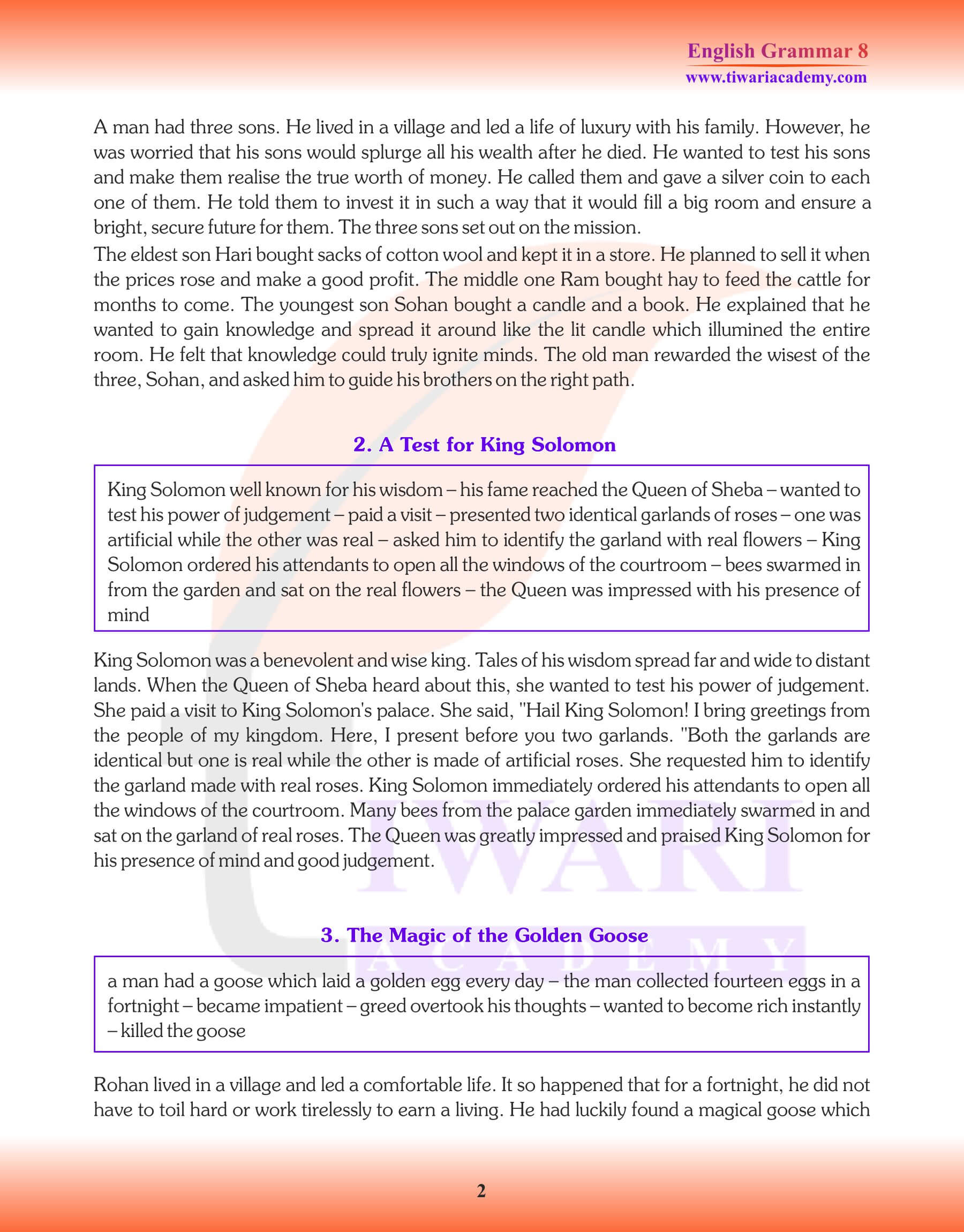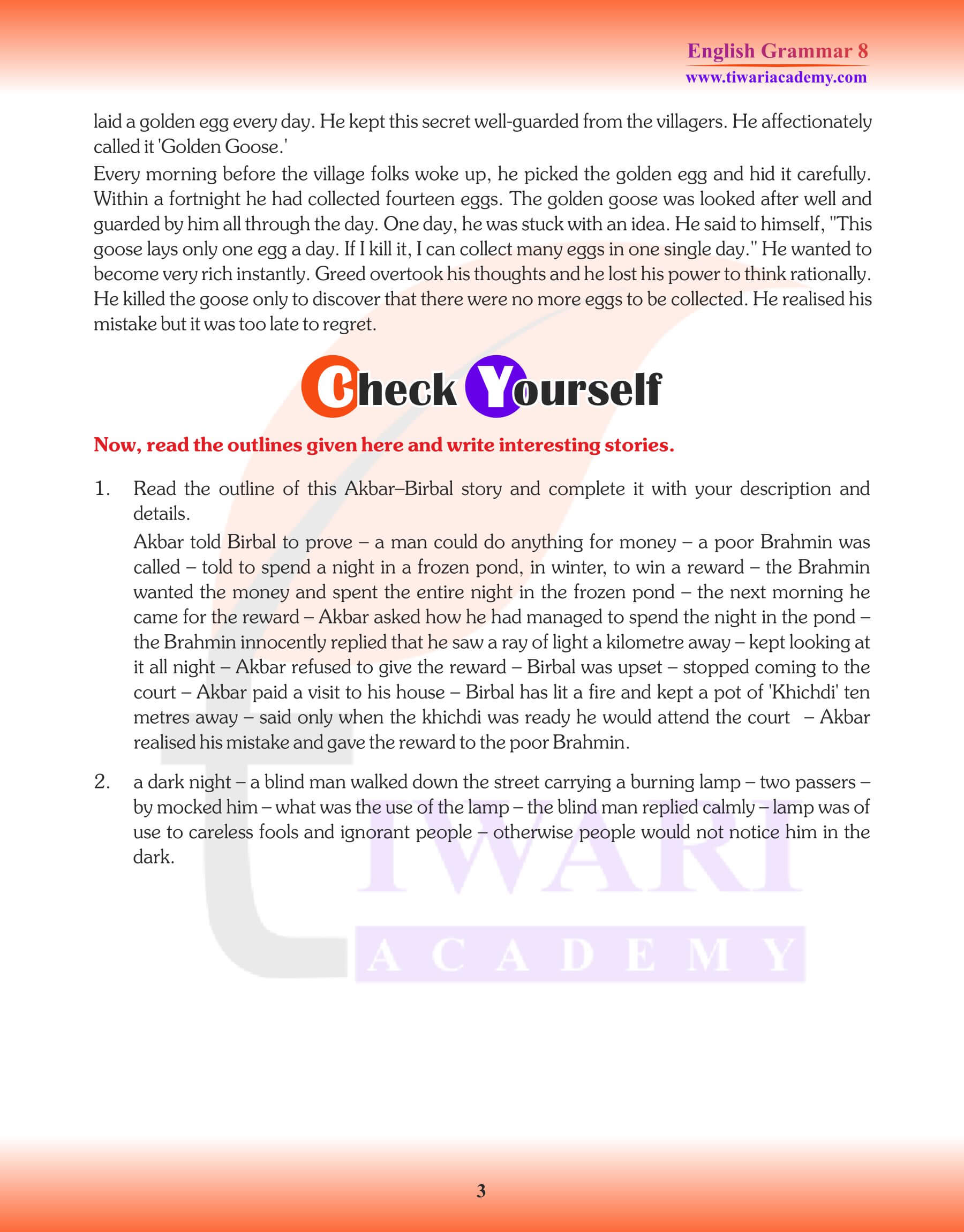Class 8 English Grammar Chapter 18 Story Writing. Stories are enjoyed by the young and the elderly alike. Stories are a work of fiction. We like to listen to them, tell and read them. Writing a story is an art. A good story writer is often an effective narrator too. Plan the plot of your story. Your story should have a beginning a middle and an end the beginning should be interesting. The middle of the story should give the details of the plot and the end should satisfactorily conclude the story.
Stories, regardless of age or culture, have always been a universal medium to captivate audiences. Whether it’s children eagerly waiting for bedtime tales or adults engrossed in novels, the allure of storytelling is undeniable. Chapter 18 of the Class 8 English Grammar, as outlined in renowned educational platforms like Tiwari Academy, dives deep into this enchanting world, providing students with invaluable insights on crafting compelling narratives.
Storytelling isn’t just about weaving words together; it’s an intricate art that involves imagination, structure, and emotion. At its core, stories are fictional creations, intricately crafted with elements that capture the reader’s imagination. They can transport readers to other worlds, tug at their heartstrings, or provoke profound thought.
| Class: 8 | English Grammar |
| Chapter: 18 | Story Writing |
| Session: | 2024-25 |
| Content: | Notes and Textbook |
| Content Type: | Text, Images and Videos |
Important points of Story Writing
- Background: Where and when and with what to the story dealing? These details should be likely and well illustrated.
- Characterization: Who is the story about? The characters should sound like real people. For this you should give them names and other features.
- Dialogues: Sprinkling dialogues between the characters in the story adds liveliness and interest. You should incorporate dialogues to make your story interesting.
- Division in to separate sections: Your Story should have paragraphs if it is short story. Each new event or incident should start with a new paragraph.
- Heading: Your story should have a title could be a popular saying that is the moral of your story or it could use the name the protagonist of the story.
- Editing: After writing your story, you need to read it aloud to yourself. Your story should sound interesting entrusting and attention grabbing. If it sound so to you, others will also enjoy listening or reading it.
Key components to crafting an engaging story include:
- The Plot: This serves as the backbone of the story. Planning the plot entails devising a central theme or conflict that drives the narrative. This is where the magic starts, setting the trajectory of the tale.
- Beginning with a Bang: An engaging story opener is crucial. It hooks readers instantly, making them yearn for more. The initial segment should spark curiosity and set the tone for the ensuing journey.
- The Detailed Middle: This section is where the story’s essence unfolds. It provides depth to characters, elucidates the plot, and heightens the tension. The middle should be rich with details, allowing readers to immerse themselves fully.
- Conclusive Ending: A well-rounded story culminates in a satisfying conclusion. The end should tie up all loose ends, offer resolution, and leave the reader with a sense of completion.
Message \Note Writing
Note can be formal or informal. They are delivered by hand. They too have heading. Salutations are written in third person in case they are formal. They have a salutation and a friendly message in case they are informal. The address, date and time are mentioned in both formal and informal notes.
Report Writing
A report is a formal record. It starts with From, To and Date. It has a little heading and a subject. The introduction mentions the reporter and the date of reporting. The activity such as questionnaire or recovery done is after that. All information is presented orderly. The report ends with recommendations and suggestions of the reporter. In the end, the reporter signs and writes his designation.
Diary Writing
Diary entry is a short composition that records the writers activities or thoughts for the day. A person who keeps a diary makes diary entries mentioning the date, day and place of activity and a small paragraph on the activity itself. A diary entry is usually signed in the end.
Summary Writing
Summary writing involves shortening the given paragraph into a brief gist .Summary is also called précis. It should be brief and concise expressing only the essential points of the paragraph.
For aspirant writers in Class 8, this chapter serves as a stepping stone. Platforms like Tiwari Academy emphasize the significance of mastering story writing early on, as it not only hones creative skills but also aids in articulating thoughts more eloquently. It’s not merely about scoring well in exams but about cultivating a skill that can be cherished for a lifetime.
In summary, Chapter 18 encapsulates the foundational elements of story writing, offering students the tools and techniques to craft captivating tales and embark on their journey as budding storytellers.
Sample Story – 1
It was the month of January. A tired traveler reached an inn. It was a stormy night. He found the door locked from inside. He was shivering with cold. He knocked at the door. The innkeeper was dishonest. He said, “ I have lost the key. Only a silver key can open it.” The traveller was very clever. He saw through his trick. He threw a rupee coin inside. The innkeeper opened the door. The traveller got in.
He wanted to pay the inn-keeper in his own coin. So he said to the innkeeper, “My bag is lying outside. Please, get it”. The inn-keeper went out and looked for the bag. He could not find it anywhere. The traveler shut the door. In fact, there was no bag outside. When the innkeeper came back, he found the door closed. He had to return the rupee to get in.
Moral: Tit for tat.
Sample Story – 2
Once there was a quarrel between the sun and the wind. Each thought itself stronger than the other. It could not be decided. Just then they saw a man walking along the road. They decided to try their strength on him. One who could make the man take off his clothes was to be the winner.
The wind tried first. It blew harder. The man held his coat tightly. The wind was unable to remove his coat. Rather he buttoned up his coat. At last, the wind stopped. It admitted that it had failed.
Now it was the turn of the sun. It began to shine brightly. It grew hot. The man felt very hot. He was unable to bear the heat. He had to put off the coat Thus the sun won and the wind lost.
Moral: Pride hath a fall
Sample Story – 3
Once there was a farmer. He lived in a village. He had a goose (hen). It laid a golden egg daily. The farmer sold the eggs. He became very rich. He had a fine house. He had many servants. But he was very greedy. He wanted to become more rich. He got tired of getting and selling one egg daily. He wanted to get all the eggs.
He thought of a plan. He went to the market. He bought a knife. He killed the goose (hen). When he tore it open and looked, there were no eggs inside. He repented over his folly. But it was too late.
Moral: Don’t be greedy, (or) Greed is a curse.
Sample Story – 4
Once there was a wood cutter. He was very honest. He lived in a village. He earned his livelihood by cutting and selling wood. One day he was cutting a tree on the bank of a river. By chance his axe fell into the river. He began to weep. He was very poor. He could not buy another axe.
God Mercury came there. He asked him why he was weeping. The poor wood cutter told him his whole story. The god at once dived into the water. He brought out a golden axe. The wood cutter refused to take it. He said. “My axe is made of iron.”
The god dived again. This time he brought out a silver axe. But the wood cutter did not take that axe also. At last the god brought out an iron axe. The wood cutter shouted with joy, “This is my axe.” The god was pleased at his honesty. He gave him all the three axes.
Moral: Honesty is the best policy.
